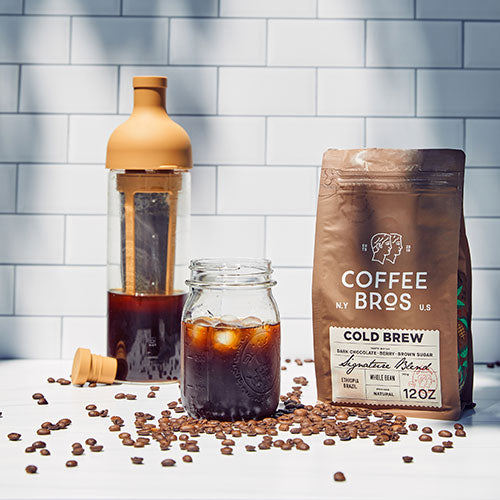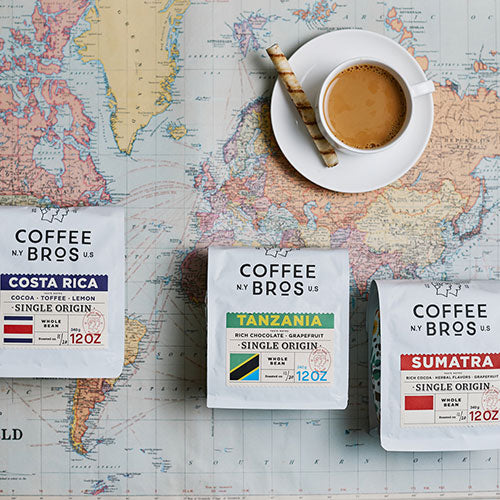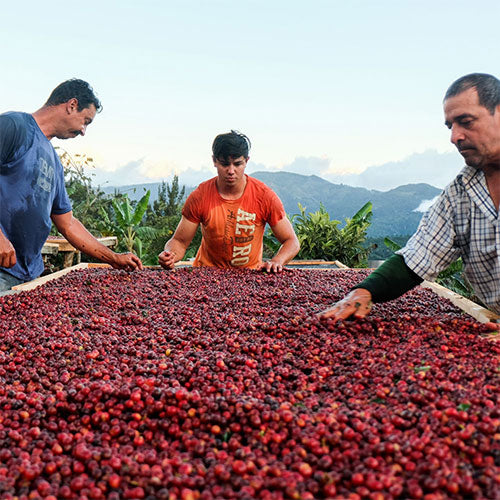You know caffeine is amazing—but it's not always clear how much caffeine different drinks have, like coffee caffeine vs tea vs soda.
This makes it hard to regulate caffeine intake. And yes, regulation is important—because there are some negative health consequences if you get too much caffeine.
In this revealing article, we'll cover…
- How much caffeine is in black coffee vs espresso
- Why caffeine in tea is confusing (but not impossible to figure out)
- Caffeine in coffee vs coke and other sodas
By the end of this article, you'll know how to choose drinks based on their caffeine levels to make sure you get the right amount without going over overboard.
Caffeine In Coffee: Black vs Espresso
There's a lot of misinformation when it comes to caffeine in black coffee and espresso. Most people assume that espresso drinks are way stronger than regular black coffee… but that assumption is wrong.
Here's why.
A regular double shot of espresso has between 60mg and 100mg of caffeine. That's for ~2 ounces of liquid, so 30-50mg of caffeine per ounce.
Now let's look at regular coffee.
A mug of black coffee typically has between 65mg and 120mg. That's for an 8-ounce cup, so 8-15mg of caffeine per ounce.
When you consider serving size, it's actually pretty close, with black coffee coming in slightly higher (on average).
But there's more to the story: most people drink more than 8-ounces of black coffee.
So if you drink 12 ounces, you end up with 100-180mg… which is potentially 2-3x as much caffeine as a double shot of espresso in a latte or cappuccino. And if you go up to 16 ounces of black coffee, the difference is even higher.
Caffeine In Tea: Not As Simple As Many Think
Like coffee, tea is grown all around the world, with thousands of genetic varieties, and processed several ways—and this leads to varying amounts of caffeine naturally.
Here's a breakdown of the many kinds of tea and their natural caffeine levels:
- Pu-erh Tea: 60-80mg of caffeine
- Black Tea: 20-80mg of caffeine
- Oolong Tea: 10-60mg of caffeine
- Green Tea: 10-40mg of caffeine
- Yellow Tea: 10-40mg of caffeine
- White Tea: 15-35mg of caffeine
On a general level, the darker (more oxidized) the tea leaf, the more caffeine it has. But even that's not always true—as you can see in the fairly big ranges of caffeine levels.
But tea doesn't only have caffeine (an upper)... it also has L-Theanine (a downer).
L-Theanine is known to reduce anxiety, calm the senses, and create good vibes.
So while the caffeine makes you alert and energized, the L-Theanine keeps away the jitters and anxiety, which helps you focus your energy boost into something productive.
Caffeine + L-Theanine = A Match Made In Heaven
Coffee Caffeine vs Tea
There's usually more caffeine in coffee than tea (there are a few exceptions out there with low-caffeine coffee beans and high-caffeine black and oolong teas).
Here's one way to think about it: a typical cup of black tea has ~50% the caffeine of a cup of coffee. A typical cup of oolong has ~50% the caffeine of a cup of black tea. Green tea has 50% the caffeine of oolong… and so on.
(That's an oversimplification… but it works as a memory trick.)
But compared to caffeine from coffee, the caffeine found in tea is absorbed much more slowly by your body. This leads to a smoother rise and fall (thanks, L-Theanine!).
Caffeine In Soda: Coke, Pepsi, And Beyond
Sodas are precisely manufactured drinks, so they tend to have the exact same caffeine levels from can to can (there's no natural variation because of climate, genetics, or whatever).
Here's a list of some of the most commonly-found sodas and their caffeine levels per serving, courtesy of Coffeeopolis:
- Pepsi One: 55 mg
- Mr. Pibb: 40 mg
- Sunkist Orange: 42 mg
- Wild Cherry Pepsi: 38 mg
- Pepsi-Cola: 38 mg
- Mountain Dew: 37 mg
- Diet Pepsi: 36 mg
- Coca-Cola Zero: 35 mg
- Coca-Cola: 34mg
- Diet Coke: 30.4 mg
- Dr. Pepper: 27 mg
Caffeine-free sodas include Sprite, 7-Up, ginger ales, and a bunch of other fruit-flavored soft drinks.
These are for 12-ounce cans and bottles, but if you order them at a restaurant and get any refills, just keep in mind that you'll probably have more caffeine than is listed.
Coffee Caffeine vs Soda
Overall, sodas have significantly less caffeine than coffee, between 2-4x less.
But there's another big difference to account for: sugar.
Regular sodas tend to have ~35g of sugar, which is almost 2x as much as the American Heart Association suggests consuming daily.
This sugar leads to an adrenaline rush—which gives pairs with the caffeine to give you a big (and fleeting) boost. It also can lead to heart damage and disease over time.
(Hint: coffee is actually good for your heart).
We love a cold soda every now and then, but when you compare it to the natural caffeine boost and health benefits of coffee, the choice for a daily pick-me-up is a no-brainer for us.
How To Maximize The Flavor Of Your Caffeine Boost
If you drink coffee for the caffeine, we've got great news for you!
You don't have to settle for a bold and bitter cup.
Your daily coffee can have wild flavors like strawberries, honey, and maple.
(No joke. It's delicious—and natural!)
No flavor oils. No weird additives. Only natural coffee beans.




